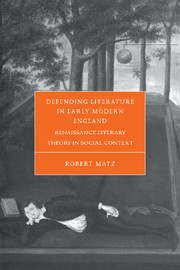Book contents
- Frontmatter
- Contents
- Acknowledgments
- 1 Introduction: “aut prodesse … aut delectare”
- 2 Recreating reading: Elyot's Boke Named the Governour
- 3 Heroic diversions: Sidney's Defence of Poetry
- 4 A “gentle discipline”: Spenser's Faerie Queene
- 5 Epilogue: from text to work?
- Notes
- Bibliography
- Index
- Cambridge Studies in Renaissance Literature and Culture
2 - Recreating reading: Elyot's Boke Named the Governour
Published online by Cambridge University Press: 13 October 2009
- Frontmatter
- Contents
- Acknowledgments
- 1 Introduction: “aut prodesse … aut delectare”
- 2 Recreating reading: Elyot's Boke Named the Governour
- 3 Heroic diversions: Sidney's Defence of Poetry
- 4 A “gentle discipline”: Spenser's Faerie Queene
- 5 Epilogue: from text to work?
- Notes
- Bibliography
- Index
- Cambridge Studies in Renaissance Literature and Culture
Summary
The honorable and onerous order of knighthood
Thomas Elyot's life and writings provide an early and notable example of the cultural transitions that I have outlined. Though Elyot's major work, the Boke Named the Governour, has often suggested to readers the Erasmian commitment of a newly reformed elite to discipline and learning, it also preserves, sometimes through striking forms of displacement or condensation, the unreformed pleasures of the old chivalric and courtly nobility. Elyot's Horatian mediation between conflicting imperatives of profit and pleasure, work and play, suggests one reason for the Governour's great success. Indeed, the book was so successful that, according to Elyot's nineteenth-century biographer, Henry H.S. Croft, its “popularity eclipsed that of any other book of the same period, not excepting even the Utopia.” Yet if Elyot's success as a writer lay in his ability to exploit the ambivalences created by a moment of cultural change, both his relatively failed political career and his own sense of his failure as a writer also suggest how the uncertainties upon which Elyot capitalized were never entirely his to control. Thus if Elyot is an exemplary figure for his early promotion in England of humanism generally and of the humanist idea of profit and pleasure in particular, he is also exemplary of a pattern of sensational biographical or authorial triumphs combined with equally sensational failures. We will see this pattern repeated with Sidney and Spenser, and forsome of the same reasons: all three writers can never fully manage the socialand cultural contradictions that motivated their lives and writing, and made both so resonant to their contemporaries.
- Type
- Chapter
- Information
- Defending Literature in Early Modern EnglandRenaissance Literary Theory in Social Context, pp. 25 - 55Publisher: Cambridge University PressPrint publication year: 2000



